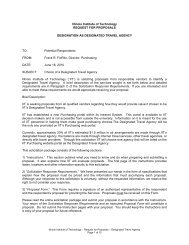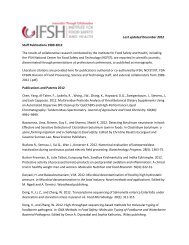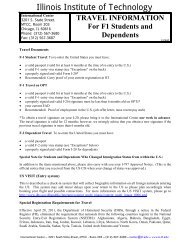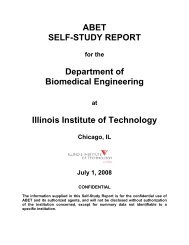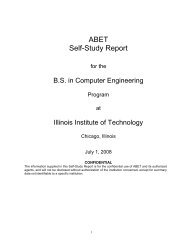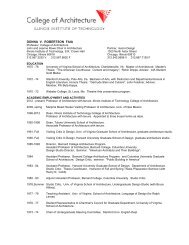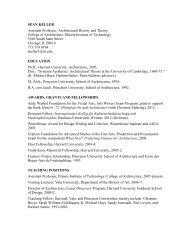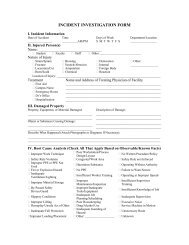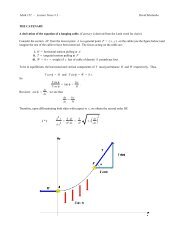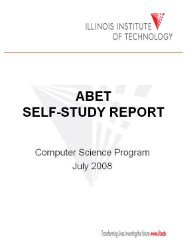Undergraduate Bulletin - Illinois Institute of Technology
Undergraduate Bulletin - Illinois Institute of Technology
Undergraduate Bulletin - Illinois Institute of Technology
You also want an ePaper? Increase the reach of your titles
YUMPU automatically turns print PDFs into web optimized ePapers that Google loves.
Course Descriptions<br />
PS 408<br />
Methods <strong>of</strong> Policy Analysis<br />
Introduces students to the field <strong>of</strong> policy analysis and<br />
acquaints them with basic methods <strong>of</strong> policy analysis and<br />
urban planning. Emphasis is on these methods and problem<br />
solving rather than on politics or the political process.<br />
Topics include decision theory, benefit/cost analysis, problem<br />
simulation, population projection, and problem definition and<br />
formulation. This seminar serves as the required capstone<br />
course for the Policy Analysis/<strong>Technology</strong> specialization.<br />
Prerequisite(s): [(PS 190-299 and PS 300-399)]<br />
(3-0-3) (C)(S)<br />
PS 420<br />
Comparative Urban Politics<br />
Compares major urban systems in a variety <strong>of</strong> settings in<br />
both developed and developing countries. The seminar gives<br />
special attention to political and economic factors shaping<br />
urbanization processes and distinctive policy issues in these<br />
different settings.<br />
Prerequisite(s): [(PS 190-299 and PS 300-399)]<br />
(3-0-3) (S)<br />
PS 422<br />
Complex Organizations<br />
Introduces students to the significant theoretical frameworks<br />
that have emerged over time to describe and explain public<br />
and non-pr<strong>of</strong>it organizations, as well as organizational actors<br />
and actions. The seminar includes consideration <strong>of</strong> relations<br />
between organization and its environment, the importance<br />
<strong>of</strong> interorganizational networks, and the role <strong>of</strong> power in<br />
organizational life. Same as SOC 422.<br />
Prerequisite(s): [(PS 190-299 and PS 300-399) OR (PS 190-<br />
299 and SOC 300-399) OR (PS 300-399 and SOC 190-299)<br />
OR (SOC 190-299 and SOC 300-399)]<br />
(3-0-3) (S)<br />
PS 438<br />
Energy & Environmental Policy<br />
Places energy and environmental policy in domestic and<br />
global context. The seminar traces the economic and political<br />
implications <strong>of</strong> dependence on fossil fuels, the attempt to<br />
develop alternate energy sources and promote conservation,<br />
the environmental effects <strong>of</strong> resource consumption, and the<br />
effort to control these effects through increased efficiency and<br />
regulation <strong>of</strong> pollution. Explored are such problems such as<br />
nuclear waste, acid rain, global warming, and deforestation.<br />
Prerequisite(s): [(PS 190-299 and PS 300-399)]<br />
(3-0-3) (S)<br />
PS 440<br />
Issues in Globalization<br />
Examines globalization, which has become a buzzword in<br />
social science and in popular discourse. This seminar investigates<br />
the economic, socio-political, and cultural aspects <strong>of</strong><br />
globalization, laying the stress on theoretical debates in the<br />
field <strong>of</strong> political economy.<br />
Prerequisite(s): [(PS 190-299 and PS 300-399)]<br />
(3-0-3) (C)(S)<br />
PS 453<br />
U.S. Regulatory Politics & Policy<br />
Examines the changing role <strong>of</strong> government regulation <strong>of</strong> private<br />
and public activities from a political and administrative<br />
perspective, from the Progressive Era to the present. The<br />
seminar investigates the regulatory process, including administrative<br />
law, standards for rule-making, and the involvement<br />
<strong>of</strong> organized groups and the courts.<br />
Prerequisite(s): [(PS 190-299 and PS 300-399)]<br />
(3-0-3) (C)(S)<br />
PS 455<br />
Political Sociology<br />
Surveys major issues and problems in the field <strong>of</strong> political<br />
sociology. Topics include the forms <strong>of</strong> political power structures,<br />
elitist approaches to politics, community and national<br />
power structures, and political socialization. Same as SOC<br />
455.<br />
Prerequisite(s): [(PS 190-299 and PS 300-399) OR (PS 190-<br />
299 and SOC 300-399) OR (PS 300-399 and SOC 190-299)<br />
OR (SOC 190-299 and SOC 300-399)]<br />
(3-0-3) (S)<br />
PS 462<br />
Issues in American Politics<br />
Intended to develop knowledge and analytical skills to assess<br />
how well our government works and how it might work better.<br />
The seminar focuses on the following: the operation <strong>of</strong> the<br />
federal executive, legislative, and judicial institutions; the<br />
policymaking process (including the role <strong>of</strong> administrators);<br />
and the power exercised by organized groups, experts, and the<br />
media. This seminar serves as the required capstone course<br />
for the American and Comparative Politics specialization.<br />
Prerequisite(s): [(PS 190-299 and PS 300-399)]<br />
(3-0-3) (C)(S)<br />
PS 465<br />
Political Economy<br />
Introduces students to advanced theories <strong>of</strong> political economy,<br />
exploring the relationship between the economy and<br />
the political system. The impact <strong>of</strong> economic ideologies<br />
will be examined, as will the structure <strong>of</strong> political and<br />
economic interests and the mediating effects <strong>of</strong> institutions<br />
on outcomes.<br />
Prerequisite(s): [(PS 190-299 and PS 300-399)]<br />
(3-0-3) (C)(S)<br />
PS 480<br />
Introduction to Survey Methodology<br />
This course will introduce advanced undergraduate students<br />
to the set <strong>of</strong> principles <strong>of</strong> survey research design that are the<br />
basis <strong>of</strong> standard practices in the social sciences. The course<br />
will discuss how to formulate research questions and develop<br />
hypotheses suitable for testing. Same as SOC 480.<br />
Prerequisite(s): [(BUS 221) OR (PS 209) OR (PSYC 203)<br />
OR (SOC 209)]<br />
(3-0-3) (S)<br />
PS 490<br />
Senior Seminar<br />
This is the capstone course for political science majors. It<br />
is intended to bring together a number <strong>of</strong> concepts, methodological<br />
approaches, and research skills while exploring a<br />
particular topic <strong>of</strong> current significance within the discipline.<br />
Prerequisite(s): [(PS 190-299 and PS 300-399)]<br />
(3-0-3) (C)(S)<br />
PS 491<br />
<strong>Undergraduate</strong> Research in Political Science<br />
Working with a member <strong>of</strong> the political science faculty,<br />
students will choose a topic, conduct research, and complete<br />
an original, independent research project.<br />
Prerequisite(s): [(PS 190-299 and PS 300-399)]<br />
(3-0-3) (C)<br />
PS 495<br />
Power & Domination<br />
Uses concepts learned in political science and sociology<br />
classes and brings them to bear on the topic <strong>of</strong> power and<br />
domination with the obvious concomitant <strong>of</strong> resistance. The<br />
seminar serves as the required capstone course for the Society,<br />
Politics, and Value specialization. Same as SOC 495.<br />
Prerequisite(s): [(PS 190-299 and PS 300-399) OR (PS 190-<br />
299 and SOC 300-399) OR (PS 300-399 and SOC 190-299)<br />
OR (SOC 190-299 and SOC 300-399)]<br />
(3-0-3) (S)<br />
255



